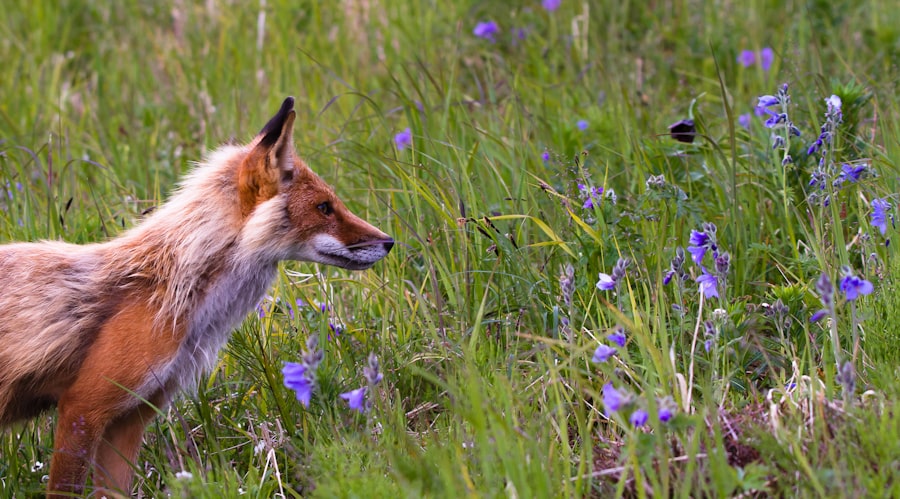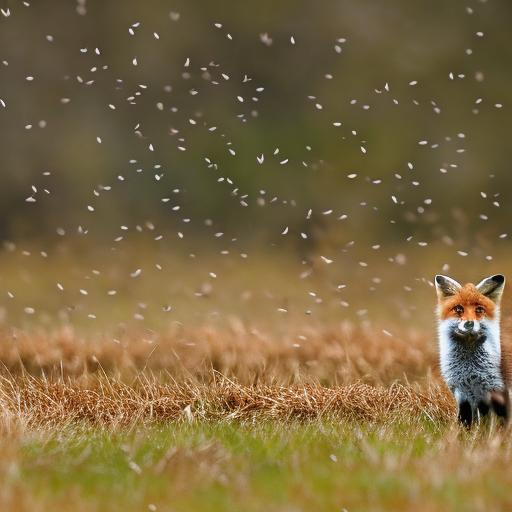Foxes preying on geese can be a significant problem for those who raise geese or have them as pets. Geese are vulnerable to fox attacks, especially during the breeding season when they are nesting and caring for their young. It is crucial to create a safe environment for geese to protect them from foxes and ensure their well-being. By understanding the habits of foxes and geese, implementing physical barriers, using natural deterrents, and taking other preventive measures, we can create a secure space for geese and minimize the risk of fox predation.
Key Takeaways
- Foxes are natural predators of geese and understanding their habits is important in protecting geese.
- Creating a secure and safe environment for geese involves providing a secure coop or pen at night.
- Physical barriers such as fences and netting can deter foxes from accessing the geese.
- Natural deterrents such as strong-smelling plants and predator urine can help keep foxes away.
- Sound and light deterrents such as alarms and flashing lights can scare off foxes.
Understanding the habits of foxes and geese
Foxes are opportunistic predators that are known for their cunning and adaptability. They have a keen sense of smell and excellent hearing, which allows them to locate potential prey from a distance. Foxes are primarily nocturnal animals, although they can also be active during the day. They are skilled hunters and can catch a variety of small animals, including birds like geese.
Geese, on the other hand, are social birds that live in flocks and have a strong instinct to protect their young. They are excellent parents and will fiercely defend their nests and goslings from any potential threats. Geese are also highly territorial and will mark their territory by hissing, flapping their wings, and even charging at intruders.
Creating a secure and safe environment for geese
Creating a safe environment for geese is essential for their well-being and protection from predators like foxes. A secure environment provides them with a sense of safety and allows them to thrive without constant fear of being attacked. Additionally, a safe environment reduces stress levels in geese, which can have a positive impact on their overall health.
A secure environment for geese can be achieved by implementing various measures such as installing physical barriers, using natural deterrents, implementing sound and light deterrents, keeping geese in a secure coop or pen at night, regularly checking the perimeter for signs of fox activity, using motion-activated sprinklers, and keeping the area clean and free of food sources that may attract foxes.
Installing physical barriers to deter foxes
One effective way to keep foxes away from geese is by installing physical barriers. These barriers can be fences, walls, or other structures that prevent foxes from accessing the area where the geese are kept. The height and strength of the barrier should be sufficient to deter foxes from attempting to climb or dig under it.
There are different types of physical barriers that can be used, depending on the specific needs and circumstances. Electric fences can be an effective deterrent as they deliver a mild electric shock to any animal that comes into contact with them. This shock is not harmful but serves as a strong deterrent for foxes. Additionally, chicken wire or mesh fencing can be used to create a physical barrier that prevents foxes from entering the area where geese are kept.
Using natural deterrents to keep foxes away
Natural deterrents can also be used to keep foxes away from geese. These deterrents take advantage of the natural instincts and aversions of foxes to certain smells or substances. For example, the scent of predator urine, such as that of a coyote or wolf, can be used to create a natural deterrent. Foxes are naturally wary of these predators and will avoid areas where their scent is present.
Another natural deterrent is the use of strong-smelling plants or herbs. Foxes have a sensitive sense of smell and are repelled by strong odors. Planting herbs like lavender, rosemary, or mint around the perimeter of the area where geese are kept can help deter foxes from approaching.
Implementing sound and light deterrents to scare off foxes

Sound and light deterrents can be effective in scaring off foxes and preventing them from approaching geese. Foxes are naturally wary of loud noises and bright lights, as these can signal danger. By using devices that emit loud noises or flashing lights, we can create a deterrent that will make foxes think twice before approaching the area where geese are kept.
There are various sound deterrents available on the market, such as ultrasonic devices that emit high-frequency sounds that are unpleasant to foxes but not audible to humans. These devices can be placed strategically around the perimeter of the area to create a sonic barrier that keeps foxes at bay.
Similarly, light deterrents can be used to scare off foxes. Motion-activated lights that turn on when a fox approaches can startle and deter them from coming any closer. These lights can be placed near the perimeter or in strategic locations where fox activity is most likely to occur.
Keeping geese in a secure coop or pen at night
One of the most important measures to protect geese from foxes is to keep them in a secure coop or pen at night. Foxes are primarily nocturnal animals and are most active during the night. By keeping geese in a secure enclosure at night, we can minimize the risk of fox attacks and ensure their safety.
The coop or pen should be sturdy and well-built, with no gaps or holes that foxes could squeeze through. It should also have a secure door or gate that can be locked to prevent any unauthorized entry. Additionally, it is important to regularly inspect the coop or pen for any signs of damage or weakness and repair them promptly.
Regularly checking the perimeter for signs of fox activity
Regularly checking the perimeter for signs of fox activity is crucial in preventing foxes from getting too close to geese. Foxes are intelligent animals and can find ways to bypass physical barriers if they are determined enough. By regularly inspecting the perimeter, we can identify any signs of fox activity, such as footprints, droppings, or signs of digging, and take appropriate action to reinforce the barriers or implement additional deterrents if necessary.
Using motion-activated sprinklers to deter foxes
Motion-activated sprinklers can be an effective deterrent to keep foxes away from geese. These sprinklers are equipped with motion sensors that detect the presence of animals and activate a burst of water. The sudden spray of water startles and scares off foxes, preventing them from approaching the area where geese are kept.
Motion-activated sprinklers can be placed strategically around the perimeter or in areas where fox activity is most likely to occur. They are particularly effective at night when foxes are most active. The sudden burst of water not only scares off foxes but also disrupts their hunting behavior and makes them think twice before approaching the area again.
Keeping the area clean and free of food sources that may attract foxes
Keeping the area clean and free of food sources that may attract foxes is essential in preventing them from preying on geese. Foxes are opportunistic feeders and will be attracted to areas where there is a readily available food source. By removing any potential food sources, we can reduce the likelihood of foxes being attracted to the area where geese are kept.
It is important to secure garbage cans and compost bins to prevent foxes from accessing them. Additionally, any leftover food or scraps should be properly disposed of in sealed containers. By keeping the area clean and free of food sources, we can minimize the risk of attracting foxes and reduce the likelihood of them preying on geese.
Seeking professional help if foxes continue to be a problem
If despite implementing all these measures, foxes continue to be a problem and pose a threat to geese, it may be necessary to seek professional help. Wildlife control experts or local animal control agencies can provide guidance and assistance in dealing with foxes. They can assess the situation, recommend additional measures, and even trap and relocate foxes if necessary.
It is important to remember that foxes are wild animals and should be treated with caution. Attempting to handle or remove them without proper knowledge and expertise can be dangerous and may result in harm to both humans and animals. Seeking professional help ensures that the situation is handled safely and effectively.
Creating a safe environment for geese is crucial in protecting them from fox predation. By understanding the habits of foxes and geese, implementing physical barriers, using natural deterrents, implementing sound and light deterrents, keeping geese in a secure coop or pen at night, regularly checking the perimeter for signs of fox activity, using motion-activated sprinklers, keeping the area clean and free of food sources that may attract foxes, and seeking professional help if necessary, we can create a secure space for geese and minimize the risk of fox predation. By taking these measures, we can ensure the well-being of geese and provide them with a safe environment to thrive.
If you’re looking for ways to protect your geese from foxes, you might also be interested in learning about when guinea fowl lay eggs. Guinea fowl can be excellent guardians for other poultry, including geese, as they are known for their alertness and loud alarm calls. To find out more about guinea fowl breeding and egg-laying habits, check out this informative article on poultrywizard.com. Additionally, if you’re concerned about the safety of your chickens and geese, it’s essential to have a secure chicken coop. Discover tips on choosing the right flooring for your chicken coop in this helpful article on poultrywizard.com. And if you’re considering renting a chicken coop instead of building one yourself, find out more about the benefits and considerations in this comprehensive guide on poultrywizard.com.
FAQs
What are foxes?
Foxes are small to medium-sized carnivorous mammals that belong to the Canidae family. They are known for their bushy tails and pointed ears.
Why do foxes attack geese?
Foxes are natural predators of geese and other small animals. They attack geese for food or to protect their territory.
What are the signs of a fox attack on geese?
The signs of a fox attack on geese include missing or dead geese, feathers scattered around the area, and bite marks on the geese.
How can I keep foxes away from my geese?
You can keep foxes away from your geese by installing a fence around the area where the geese are kept, using motion-activated lights or sprinklers, and keeping the area clean and free of food scraps.
What should I do if a fox attacks my geese?
If a fox attacks your geese, you should immediately remove the geese from the area and seek veterinary care for any injured geese. You should also contact your local wildlife authorities to report the incident.
Meet Walter, the feathered-friend fanatic of Florida! Nestled in the sunshine state, Walter struts through life with his feathered companions, clucking his way to happiness. With a coop that’s fancier than a five-star hotel, he’s the Don Juan of the chicken world. When he’s not teaching his hens to do the cha-cha, you’ll find him in a heated debate with his prized rooster, Sir Clucks-a-Lot. Walter’s poultry passion is no yolk; he’s the sunny-side-up guy you never knew you needed in your flock of friends!







